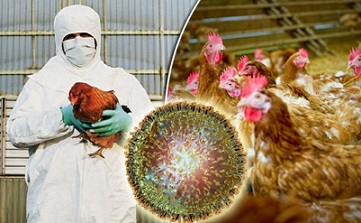H5N1 News: South Africa Sees A Variety Of HPAI H7 And H5 Subtypes Infecting Birds And Poultry. Experts Warn Of Zoonotic Transmissions To Humans
Nikhil Prasad Fact checked by:Thailand Medical News Team Sep 27, 2023 2 years, 3 months, 4 weeks, 10 hours, 39 minutes ago
H5N1 News: In a dire turn of events, South Africa is grappling with a severe avian influenza outbreak that has wreaked havoc on the poultry industry, resulting in the loss of over 2.6 million birds. The outbreak has sent shockwaves through the nation, with experts warning of the potential for zoonotic transmissions to humans. This alarming situation has prompted the South African government to urge farmers to intensify biosecurity measures and fast-track the development of vaccines to combat the highly pathogenic avian influenza (HPAI) that has struck the country.
 Widespread Outbreak Across Provinces
Widespread Outbreak Across Provinces
As the nation grapples with the avian flu crisis, the Department of Agriculture has revealed that six out of South Africa's nine provinces have been affected by the outbreak, with 50 confirmed subtypes of HPAI H7 and 10 subtypes of HPAI H5 subtypes including H5N1 in circulation.
The Gauteng province has been the hardest hit by the lethal HPAI H7 strain, reporting 37 different subtypes, while the Western Cape is grappling with the majority of HPAI H5 outbreaks.
Experts are worried that with many HPAI subtypes in circulation, the possibility of recombinant events taking place are very high!
Reggie Ngcobo, spokesperson for the Department of Agriculture, Land Reform, and Rural Development, disclosed alarming figures to various
H5N1 News media related to the impact of the avian flu. He stated that a staggering 107,705 chickens had already succumbed to the disease, with commercial chicken farms culling over 1.3 million birds. In total, South Africa has suffered the loss of 1,426,226 chickens due to the outbreak.
The Western Cape bore the brunt of the HPAI H5 outbreak, with seven confirmed cases, followed by KwaZulu-Natal. The impact on chickens in this province has been significant, with 98,249 deaths and over 1.1 million culled, resulting in a total loss of 1,254,532 chickens.
Rapid Government Response
Recognizing the gravity of the situation, the South African government has taken swift action to address the avian flu crisis. With vaccines currently unavailable in the country, government negotiations to secure access to vaccines are in advanced stages. Additionally, the registration process for these vaccines is being expedited to combat the spread of the virus.
"The criteria under which vaccination will be permitted is almost in its final development, and only farms with good biosecurity and approval from the department will be given permission to vaccinate," the Department of Agriculture stated.
Poultry Industry in Turmoil
The avian flu outbreak has dealt a devastating blow to South Africa's poultry industry. The nation's largest poultry producer, Astral Foods, issued a stark warning of impending shortages of eggs and poultry meat in the coming months due to the combined impact of the bird flu outbreak and power cuts on the industry.
Quantum Foods, another major player in the industry, reported a loss of nearly two million chickens, valued at more than 100 million rand
(US$5.3 million), attributed to the avian flu. Astral Foods echoed these concerns in a trading update, stating that this outbreak was the worst South Africa had ever witnessed and had already caused shortages of table eggs in the market, with potential negative effects on poultry meat supply in the coming months. The financial toll on Astral Foods alone has reached 220 million rand.
Escalation of Avian Influenza
The outbreak in South Africa is part of a larger global trend of avian influenza cases on the rise. South Africa reported its first bird flu cases in commercial farms in April, marking the beginning of this devastating outbreak. This year, the country has contended with two different strains of the virus: the infamous H5N1 and a newly identified strain, H7N6.
H5N1, in particular, has raised concerns as it is increasingly infecting mammals worldwide, from sea lions in Argentina to foxes in Finland. This raises fears that it could become more easily transmissible to humans. While bird flu typically does not infect humans, H5N1's growing presence in mammals has experts worried about the possibility of zoonotic transmissions.
Unprecedented Avian Flu Cases
The South African Poultry Association (SAPA) has reported that the number of avian flu cases in the country this year has surpassed any previous year since the first outbreaks were reported in commercial farms in 2017. This escalation in avian flu cases is a cause for concern, as it represents the largest outbreak ever witnessed.
The severity of the situation in South Africa underscores the urgent need for comprehensive biosecurity measures and the rapid development and distribution of vaccines to safeguard both the poultry industry and the health of the nation's citizens. With the virus showing no signs of relenting, South Africa faces a significant challenge in containing this avian influenza outbreak and preventing potential zoonotic transmissions to humans. The coming months will be critical in determining the trajectory of this crisis and the measures taken to combat it.
For the latest
H5N1 News, keep on logging to Thailand Medical News.
